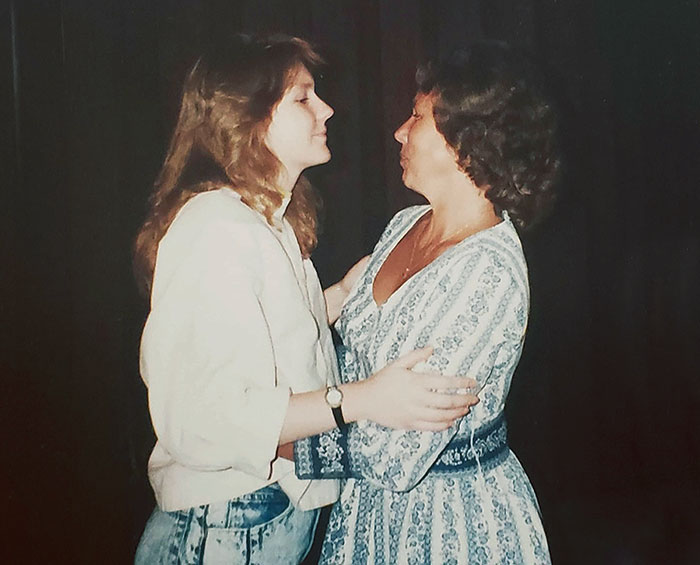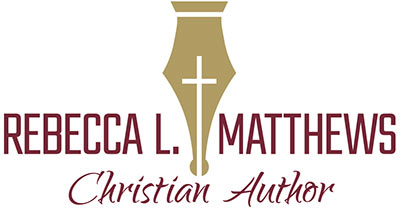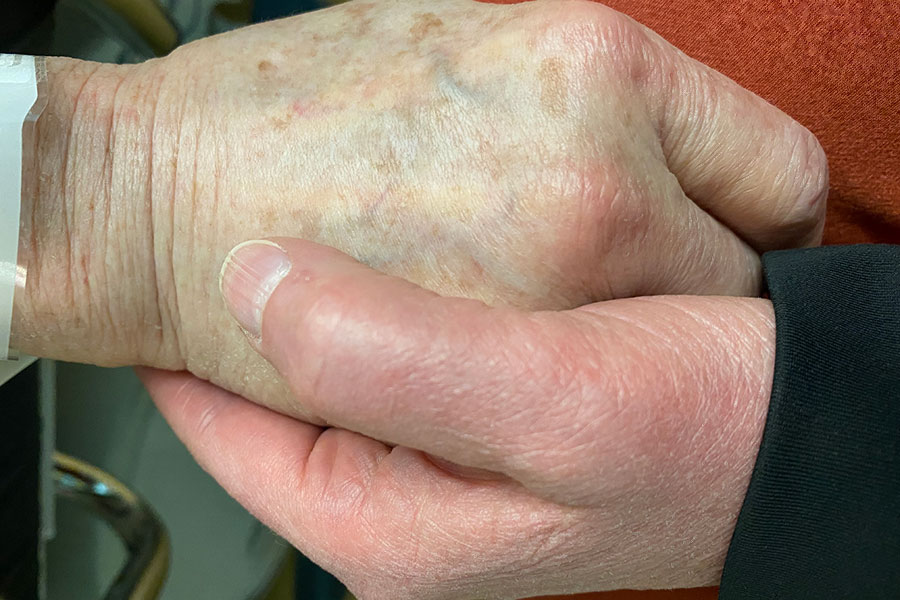“I’m sorry you’re hurting,” I said as I helplessly watched her writhe in pain. I’d let go of her hand, as any touch, she’d said time and time again, exacerbated the agony.
“Don’t be sorry,” my Mom whispered back through tense and rigid features. Even in the midst of her torture, she chose to comfort me.
God is good, but sometimes we don’t recognize it until later; after the trauma plays out, after the guilt sets in.
He lays the groundwork and, like a domino chain reaction, when the timing is right, God tips the initiating piece and revelation soon follows.
It’d been a journey, a quick one, during which I’d traveled through frustration toward my mother, then excitement and hope for her future, and finally, reconciliation with myself while waiting at her hospice bedside.
Ultimately, God used her, my dying mother, to answer my anguish when she, herself, was unable to communicate anymore.
My joy for her upcoming travels to heaven had dissipated, confidence in my decisions on her behalf had become shaky, and my thoughts had taken a dark shift toward “what if.”
You see, I was her voice, appointed and trusted by both her and my step-dad. Confident in faith and mission, I was ready to be, for this meek woman, all she’d given up by not advocating for herself throughout her life.
But four in the morning can be a dark place when seated at the bedside of impending death, especially that of someone so precious.
What if these decisions I’d made for her were wrong? What if there’d been another option? What if life could have continued, and what if it would’ve been great?
Sleep deprivation is no friend at times like these when it twists my words of “I’m sorry you’re hurting” into the haunting feeling that “I’m sorry I’m killing you.”
What if…
We laughed mostly, cried some, my sisters and I, as we shared with our mom our memories, music, and meaningful scriptures. From our unique perspectives, we spoke stories of each of our lives with her and our four brothers.
She was medicated for comfort, but her subtle movements seemed to indicate full involvement in our discussions. We were four women of faith, sisters in Christ rather than mother and daughters, rejoicing together, even while waiting for life to change.
Instead of a stale-aired hospice room harboring specters awaiting death, the Spirit of the Lord was present and participating, illuminating every crevice as well as each heart.
The joy of the Lord was the strength in each one of us, the living and the dying, and we were truly blessed.
But as I settled down to a rest overdue, my step-father’s last e-mail hit me hard. Not at first. It began to tear away, piece by piece, the truth of our situation until I lay close by my mother with doubt clouding my faith.
I listened to her breaths, and with each rasp I stepped deeper into fear. But what had triggered it?
Hope, my step-dad’s, was oddly the catalyst. I felt for him, for his disbelief at the sudden change of his life, their life together, and his suggestion in his message that “maybe she ain’t” dying.
She was. The dying process was in motion, and my decisions on her behalf set it like stone. “Comfort care” is what she was receiving. No miracle of life was going to occur, not physically anyway, and I suddenly had doubt.
What had I done? What else could I have done? I struggled as I listened to her breathe, a sound that soon would not be available for me to enjoy. I’m going to miss it, her, our talks, our laughs, and even my occasional frustration with her.
It was sudden and unexpected. Though pain had been steadily and progressively eroding away the quality of her life for years, the discovery of debilitating masses in her brain and spinal column drastically transformed our direction.
And within moments, which are now a blur, my new role to advocate for her life shifted. I now sit at her side in these final moments, an advocate for her death, and I am struggling.
I want her to return to the bedroom I tidied for her, to the mental health care I was setting up for her so that she might better enjoy all she’s blessed with.
The future I’d imagined for she and my step-father was to be filled with joy and renewed strength since I was going to help her work toward better overall health. As her advocate, I had high hopes and big plans. They were attainable, I was certain of it.
And yet, here I sit, counting seconds between breaths, unsure how to cope with my newfound struggle of what if…
Then God tipped the first domino and the pieces of my doubt started to fall, ultimately revealing truth once more to this questioning heart of mine.
“Don’t be sorry,” Mom had said a mere three days earlier. In a way, her whispered words didn’t make sense to me then. I was not accepting blame by saying I was sorry, I was trying to offer comfort. The pain she was experiencing was relentless. Of course I was sorry.
Today, in the dark of our room, with her presently steady breaths the background music for my heart, God has used her words to comfort me in my time of confusion.
In the dark questioning of my newly created but short-lived advocacy role, God gave me assurance by returning her words to me. Though she could no longer speak, this revelation, first set in motion days earlier, was powerful, and it released me.
My fears suddenly dissipated, the heavy burden lifted from my heart, and I returned to a trust that God IS in control, that He IS good, and that her pain being eternally soothed WAS the only option available.
Mom will soon be praising our Lord face-to-face.
I won’t hear her voice again, and I miss it already, but the faith we’ve shared as sisters in Christ assures me that our many discussions will return to my heart throughout the rest of my life.
She sang to Jesus in the hospital while the pain was great and her voice was becoming fainter. With joy evident in her whispered words, she said she was going soon. She excitedly shared that she could, right then, smell “the fragrance after the rain” of which she’d just sung about.
She was rejoicing and looking forward to passing on. So, as she encouraged me then, I will not be sorry. In the midst of this transition of life, I will trust You, Lord. And one day soon, I’ll also smell the fragrance after the rain of this, my storm of loss.
Thank you, Mom, for all you’ve done for me, but mostly for the faith we’ve shared. I love you and miss you already.
“Jesus, Jesus, Jesus, there’s just something about that name.
Master, Savior, Jesus, like the fragrance after the rain.
Jesus, Jesus, Jesus, let all heaven and earth proclaim:
Kings and kingdoms will all pass away, but there’s something about that name.”


